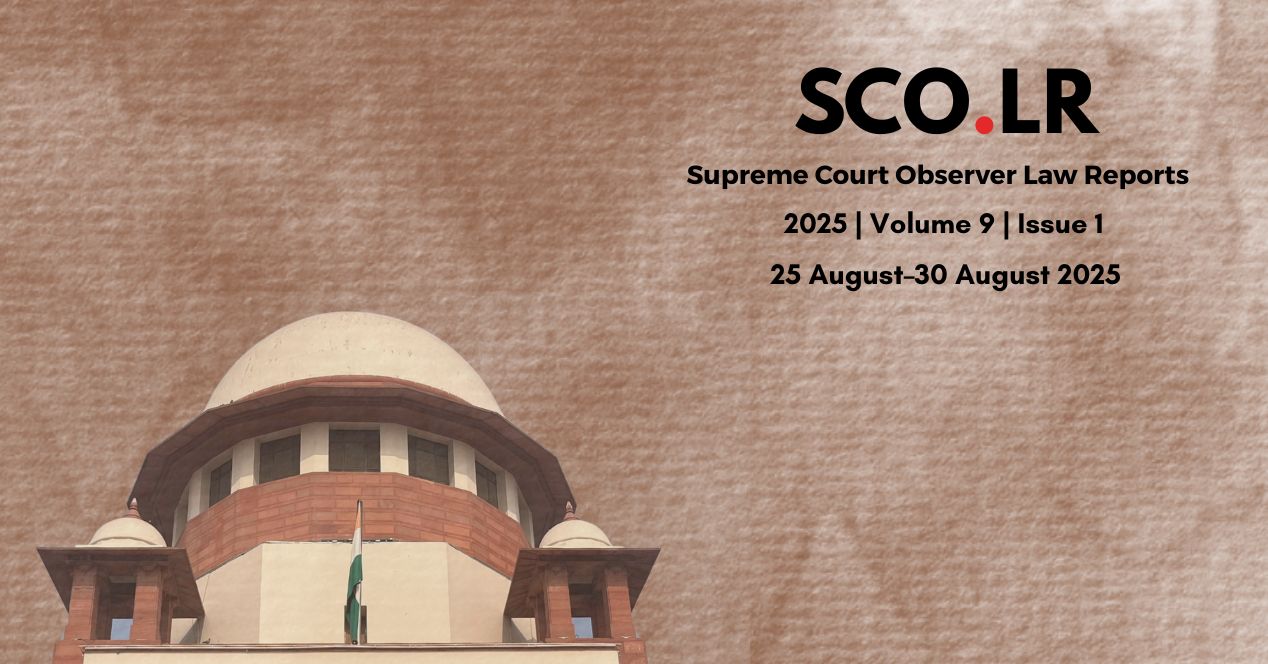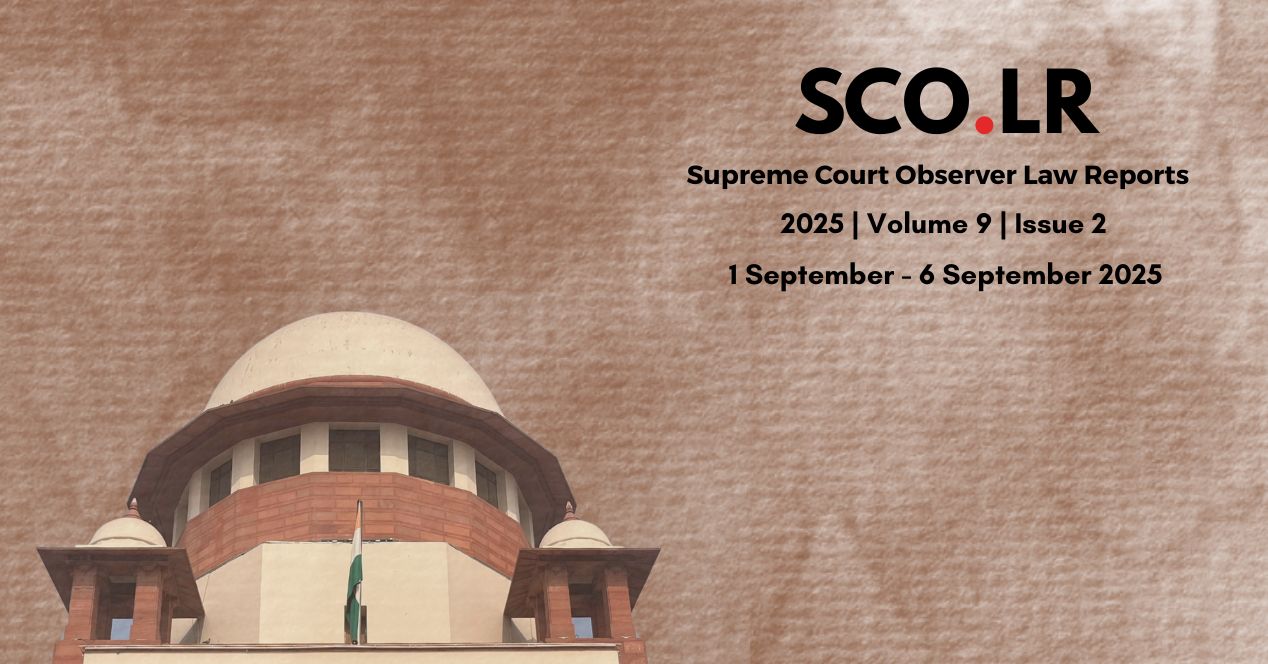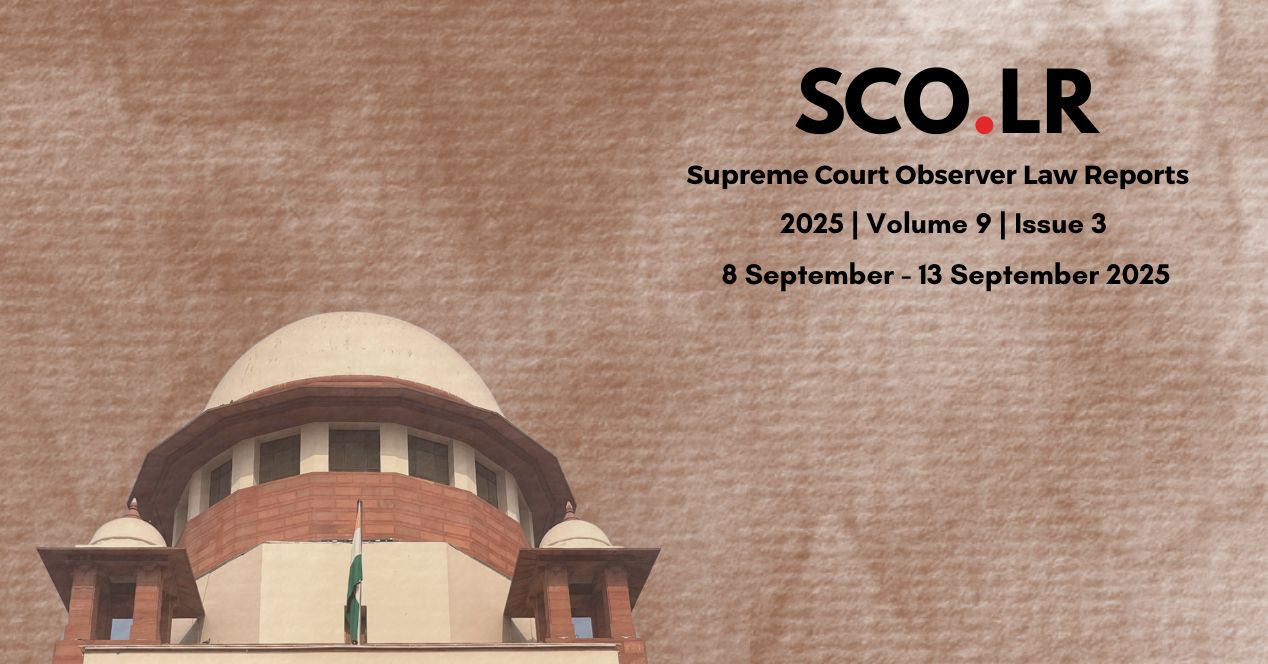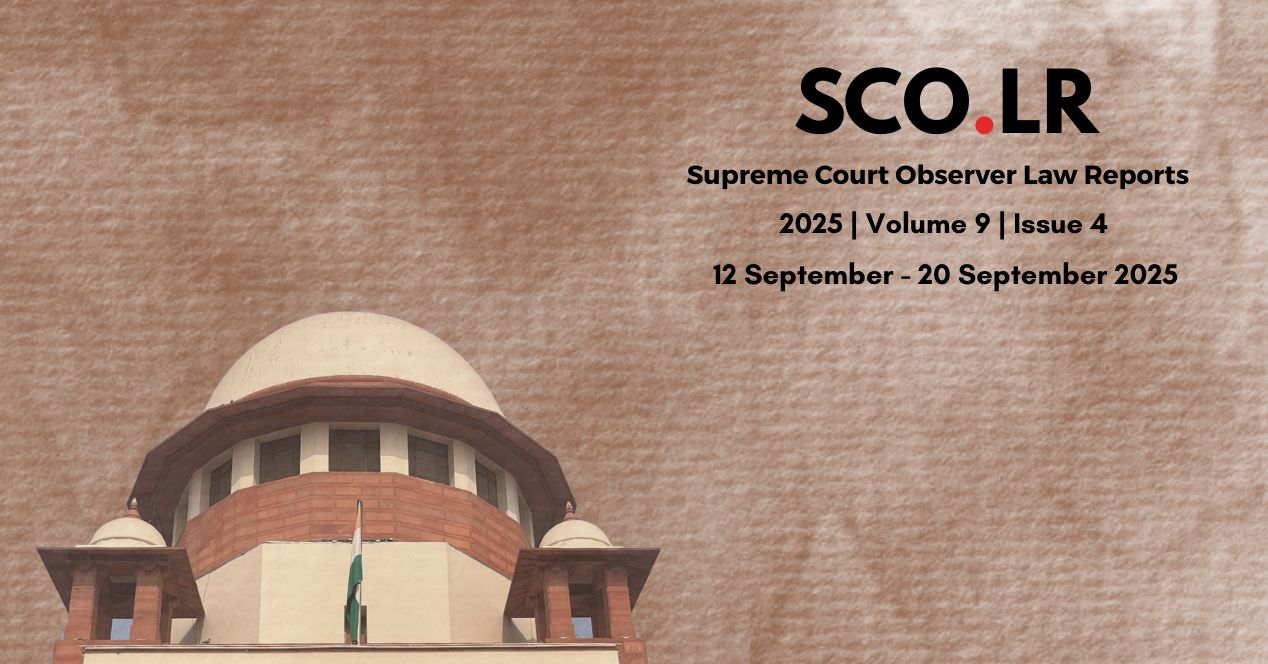Analysis
SCO.LR | 2025 | Volume 10 | Issue 1
In this Issue of SCO.LR, we bring you five important judgements from 22 September to 6 October 2025
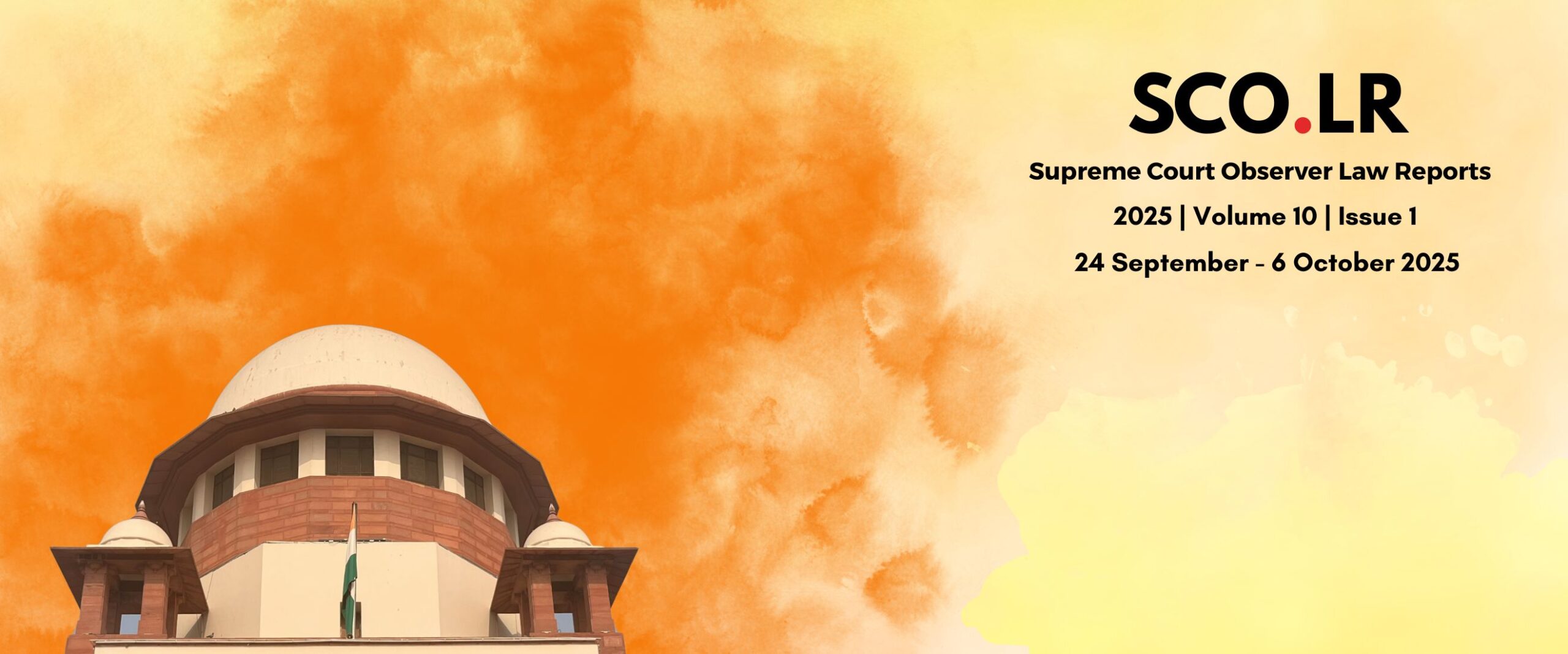
Volume 10 Issue 1 of SCO.LR is here!
With the Supreme Court on Dusshehra leave last week, we’ve included key decisions from the preceding days (24 September – 6 October 2025). This issue covers five important decisions: misuse of criminal law in civil disputes, perversity in bail orders, validity of vague allegations under Section 498A IPC, arbitral tribunals rewriting contracts and the survival of motor vehicles compensation claims after a claimant’s unrelated death.
All judgments are available in HTML, with a feature to link paragraphs directly to your research and assignments.
Read the full issue on our SCO.LR page.
The Supreme Court Observer Law Reports
SCO.LR | Volume 10 | Issue 1
24 September – 6 October 2025
**********
Use of criminal law as a tool to settle scores in civil disputes
Anukul Singh v State of Uttar Pradesh
24 September 2025
Citations: 2025 INSC 1153 | 2025 SCO.LR 10(1)[1]
Bench: Justices B.V. Nagarathna and R. Mahadevan
The Supreme Court held that the High Court’s inherent power under Section 482 of the Code of Criminal Procedure, 1973 is wide and must be exercised sparingly, when criminal colour has been given to a civil dispute.
Eight FIRs were registered against Anukul Singh within a short span during a civil dispute over ownership and possession of property involving Singh. The Allahabad High Court failed to infer that the cases were being filed malafide. Police filed a charge sheet for offences under sections 420, 467 and 468 of the Indian Penal Code, 1860, though the dispute concerned repayment of loan money and coercion in execution of documents.
The Supreme Court set aside the High Court judgement and held that criminal law cannot be permitted to be misused for settling civil disputes or to wreak vengeance. It further set aside the FIR and the consequential charge sheet pending before the Trial Court. The Court clarified that parties are free to pursue civil remedies.
Key words/phrases: Section 482 CrPC—High Court’s inherent power—prevent misuse of criminal law in civil disputes—8 FIRs after initiation of civil proceedings—inference of malafides—filing of charge sheet under Sections 420, 467 and 468 of IPC—cheating and forgery prima facie not made out—Haryana v Bhajan Lal (1992) —duty to prevent abuse of process of law
Read the Judgement here.
Mindmap**********
Grant of Bail in Disregard of Prior Judicial Findings Amounts to Perversity
Netsity Systems Pvt. Ltd. v State Govt. of NCT of Delhi
25 September 2025
Citations: 2025 INSC 1181 | 2025 SCO.LR 10(1)[2]
Bench: Justices Ahsanuddin Amanullah and S.V. Bhatti
The Supreme Court held that bail granted in disregard of prior judicial findings recording false undertakings, dishonest conduct and misuse of process, is perverse and liable to be set aside.
The accused husband and wife had allegedly cheated the complainant company of ₹1.9 crores in a property transaction and failed to honour undertakings to repay ₹6.25 crores. The Delhi High Court had previously rejected anticipatory bail under Section 438 CrPC, having recorded findings of deceit and abuse of interim protection. Despite these findings, the Additional Chief Metropolitan Magistrate (ACMM) granted regular bail after the filing of the charge sheet. The Sessions Court and later the Delhi High Court affirmed the ACMM’s decision
The Court observed that where a superior court has recorded conclusions of false undertakings or dishonest conduct, a subordinate court cannot disregard those findings or reopen the issue on identical facts. The Supreme Court set aside the impugned orders. The accused were directed to surrender within two weeks. The ACMM and Sessions Judge were directed to undergo short-term training at the Delhi Judicial Academy on bail jurisprudence and judicial discipline.
Key words/phrases: Code of Criminal Procedure, 1973—Sections 437, 438 & 439—bail jurisdiction—judicial discipline—prior judicial findings binding—perversity in exercise of discretion—false undertakings—misuse of process—training of judicial officers
Read the Judgement here.
Mindmap**********
Cruelty Under Section 498A Cannot Be Sustained on Vague Allegations
Sanjay D. Jain v State of Maharashtra
26 September 2025
Citations: 2025 INSC 1168 | 2025 SCO.LR 10(1)[3]
Bench: Chief Justice B.R. Gavai, Justices K.V. Chandran and A.S. Chandurkar
The Supreme Court held that criminal proceedings based on vague and general allegations, unsupported by statutory ingredients of the offence cannot sustain a prima facie case. It emphasised that Section 498A of the Indian Penal Code, 1860 cannot be extended to relatives without specific allegations.
The complainant was married to Piyush. She filed a case alleging that her father-, mother- and sister-in-law were demanding gifts and dowry. The complainant invoked Sections 498A (cruelty by husband or relatives of husband), 377 (unnatural sex) and 506 (criminal intimidation) against them. When an FIR was registered, Piyush and his family filed an application seeking quashing of the proceedings, arguing that the FIR contained no details of their involvement in the alleged offences. The High Court dismissed the application, relying on the complainant’s claims. While Piyush did not appeal, his family approached the Supreme Court.
The Supreme Court quashed the criminal proceedings against the relatives. It held that allegations against the appellants were general and vague and did not sufficiently satisfy the conditions under any of the alleged offences. For the offences to be made out, cruelty caused by the husband’s family must be inflicted with the intention to cause grave injury or drive the victim to commit suicide or inflict grave injury to herself.
Keywords/phrases: Section 498A IPC—alleged dowry demands and cruelty by husband’s relatives—FIR lodged, relatives sought quashing—High Court dismissed—Supreme Court—vague/general allegations, no statutory ingredients—criminal proceedings against relatives quashed—trial continues against husband
Read the Judgement here.
Mindmap**********
Arbitral Tribunal Cannot Rewrite Contract
SEPCO Electric Power Construction Corporation v GMR Kamalanga Energy Ltd
26 September 2025
Citations: 2025 INSC 1171 | 2025 SCO.LR 10(1)[4]
Bench: Chief Justice B.R. Gavai and Justice A.G. Masih
The Supreme Court held that an arbitral tribunal cannot travel beyond its mandate to rewrite the contract. The Bench reiterated that a court is obligated to interfere with an award if the conditions mandating reappreciation of the merits under Section 34 of the Arbitration and Conciliation Act, 1996, are fulfilled.
SEPCO, a China-based EPC contractor, entered into several agreements with GMRKE Limited for the construction of four coal-fired thermal plant units in Odisha. SEPCO raised a notice of arbitration for disputes related to payments. The tribunal awarded ₹995 crores to SEPCO. A single judge of the Odisha High Court upheld the award. A Division Bench set aside the award on multiple grounds including the finding that the tribunal’s rewriting of a ‘waiver of notice’ provision in the agreement was against the fundamental policy of Indian law.
The Supreme Court upheld the Division Bench’s setting aside of the entire award. It confirmed that the Division Bench had correctly found that estoppel was barred by the parties through the inclusion of “No Waiver” and “No Oral Modification” clauses. In favouring SEPCO’s claim of ‘waiver of notice’, the tribunal had erred in ignoring express contractual provisions. The Court also found that the tribunal had not fulfilled its explicit duty under Section 28(3) of the Arbitration Act, which requires it to resolve disputes in accordance with contractual terms.
Key words/phrases: Section 34 Arbitration Act—Section 37 Arbitration Act—Section 28(3) Arbitration Act—setting aside arbitral award—waiver of notice—estoppel—fundamental policy of Indian law—reappreciation of merits—rewriting contract—entire award—express provisions—terms of contract
Read the Judgement here.
Mindmap**********
Right to Seek Compensation Survives the Death of a Claimant
Dhannalal alias Dhanraj (Dead) through LRs v Nasir Khan
26 September 2025
Citations: 2025 INSC 1177 | 2025 SCO.LR 10(1)[5]
Bench: Justices K. V. Chandran and N.V. Anjaria
The Supreme Court held that the right to seek compensation for injuries in a motor accident under Section 166(5) of the Motor Vehicles Act, 1988 (MV Act) survives to the legal representatives of the deceased claimant, even when death is unrelated to the injuries.
The claimant, who had suffered 100 percent permanent disability in a 2013 accident, was awarded compensation by the Motor Accident Claims Tribunal. Dissatisfied with the quantum, he preferred an appeal before the High Court seeking enhancement, which was partly allowed. He died during the pendency of the appeal. The insurer argued that the claim was personal in nature and stood extinguished under Section 306 of the Indian Succession Act, 1925.
The Court held that Section 166(5) of the MV Act expressly preserves the right to continue proceedings despite the claimant’s death, overriding the bar contained in Section 306 of the Indian Succession Act. The provision, introduced by the 2019 amendment, was intended to remove the hardship caused by abatement of genuine claims where death was unconnected to the accident. The Court observed that the right to compensation, once accrued, becomes part of the deceased’s estate and must be recoverable by the legal representatives.
Key words/phrases: Motor Vehicles Act, 1988—Section 166(5)—right to compensation—survival of cause of action—injury claims—abatement—legal representatives—Indian Succession Act, 1925—Section 306—pecuniary loss to estate—amendment by Act 32 of 2019—income assessment—multiplier
Read the Judgement here.
Mindmap
